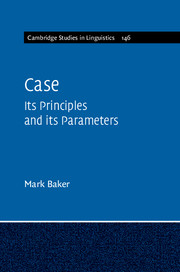Book contents
- Frontmatter
- Contents
- Acknowledgements
- Abbreviations and conventions
- Map of principal languages investigated and their case systems
- 1 The issue of structural case
- 2 The variable relationship of case and agreement
- 3 C-command factors in case assignment
- 4 Domains of dependent case assignment
- 5 Categories involved in case interactions
- 6 On the timing of case assignment
- 7 Conclusion: Putting together the big picture
- References
- Index
2 - The variable relationship of case and agreement
Published online by Cambridge University Press: 05 August 2015
- Frontmatter
- Contents
- Acknowledgements
- Abbreviations and conventions
- Map of principal languages investigated and their case systems
- 1 The issue of structural case
- 2 The variable relationship of case and agreement
- 3 C-command factors in case assignment
- 4 Domains of dependent case assignment
- 5 Categories involved in case interactions
- 6 On the timing of case assignment
- 7 Conclusion: Putting together the big picture
- References
- Index
Summary
Having characterized in Chapter 1 what I take to be the overarching puzzles of structural case, I proceed by taking stock of what theoretical resources are on hand for addressing it.
The baseline, “lingua franca” idea in the recent generative literature has been that structural case is assigned to an NP by a nearby functional category F when Chomsky's (2000, 2001: 137) relation of Agree holds between F and NP. Moreover, the properties of Agree are fairly well defined in the literature originating with Chomsky (2000, 2001) (see also Baker [(2008, 2013a, c)] for overviews, among many others). First, F must c-command NP in order to agree with it. Second, F and NP must “Match” in the sense that they are specified as having the same feature attributes, valued on NP and unvalued on F. Third, there must be no other NP with the feature attributes that F is looking for that intervenes between F and the NP that it agrees with. Fourth, there must not be a spell out domain (phase) that contains NP but not F. Fifth, NP must be “active” for agreement by having an unvalued case feature. There are also proposals about how Agree might be parameterized across languages. For example, in Baker (2008) I argued that some languages require that an NP c-command F for agreement to happen between them, rather than that F c-command NP, and also that the activity condition holds in some languages but not others. One aspect of this cluster of ideas that is less clear is what the range of agreeing and case-assigning functional heads is, and why. But the usual suspects include finite T/Infl, which assigns nominative case under Agree, and active v/Voice, which assigns accusative. A natural generalization is to say that possessive D assigns genitive case under Agree inside NPs.
- Type
- Chapter
- Information
- CaseIts Principles and its Parameters, pp. 28 - 78Publisher: Cambridge University PressPrint publication year: 2015



